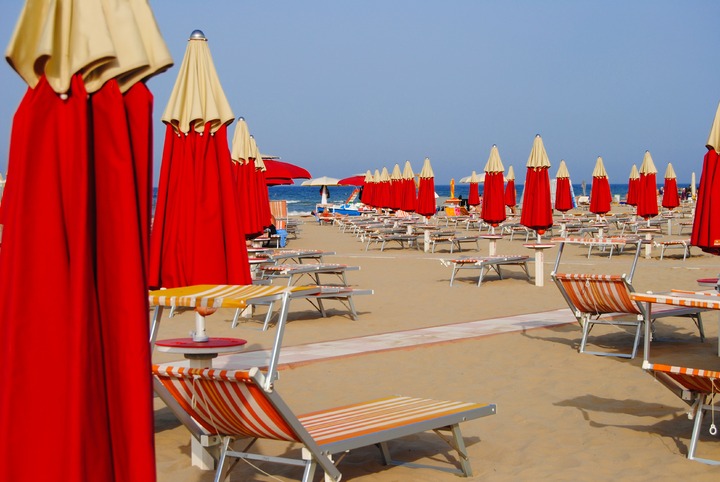This morning, from 7:30 to 9:30, many Italian beaches saw closed umbrellas as part of a national strike by beach operators. The strike, aimed at demanding clarity on the concessions expiring at the end of the year, affected various coastal regions across the mainland and islands. However, the industry is divided: while organizations like Sib-Confcommercio and Fiba-Confesercenti supported the strike, others such as Assobalneari, Federbalneari, and Cna distanced themselves, labeling it a “spot initiative.”
The highest participation was reported in Liguria, where the strike saw up to 90% of operators involved, and in some areas, 100%. In Sardinia, beaches from Cagliari’s Poetto to Villasimius, Chia, and Alghero were also affected, with umbrellas closed in protest against the government’s failure to issue new rules for beach establishments. On the Roman coast, nearly all operators participated, with two-hour closures, and in the Marche region, over 50% joined the strike. In Versilia, only one in four beach establishments participated, though Lido di Camaiore saw a complete shutdown. However, the situation was different on the Romagna Riviera, where the protest took a gentler form, with open umbrellas and a toast with tourists.
In Sicily, the strike was inconsistent, with umbrellas open in places like Palermo and Taormina but closed in Catania, Agrigento, and Mazara del Vallo. On the Calabrian coast, including Tropea and the Costa degli Dei, the strike had little impact, and some beach operators were unaware of it.
In Liguria, the strike was described as a “resounding success,” with up to 90% participation. According to Enrico Schiappapietra of Balneari Savona, “The best part was the solidarity from our customers, who are also concerned about the potential changes.” Many establishments softened the impact of the strike by offering breakfast, greeting guests, or leaving flowers on tables.
Fiba Confesercenti reported a higher-than-expected participation, with around 80% of operators closing their umbrella services nationwide. President Maurizio Rustignoli emphasized the importance of this movement, urging the government to establish clear, definitive laws to secure the future of Italian beach businesses. Rustignoli also noted that support from customers has been strong, although he apologized for any inconvenience caused.
In Ostia, nearly all beach establishments participated in the strike, with slogans like “If the government goes on vacation, we close the umbrellas.” Edoardo Moscara of Fibe-Confcommercio Rome expressed frustration with the lack of government clarity on the future of 30,000 businesses. Meanwhile, a symbolic protest took place in Fiumicino, with a flash mob in the sea involving lifeguards, to draw attention to the uncertainty surrounding the sector.
In Versilia, the strike saw one in four establishments participate, with Lido di Camaiore leading the way by opening umbrellas later than usual. There was concern among operators about the impending expiration of concessions, which has driven the ongoing protests.
In the Marche region, the strike began with umbrellas closed until 9:30 AM, and a recent development saw the government express its intention to address the issue in early September, leading to the cancellation of two additional planned strike days later in August. However, the demand for clarity on the future of these businesses remains strong.
The consumer association Codacons called the strike a “flop,” citing lower-than-expected participation and a divided industry. Codacons criticized the timing of the strike during peak season, arguing it failed to achieve its goals. The association also highlighted the significant price increases in beach services in recent years, with beach businesses now generating around €10 billion annually. The cost of renting an umbrella and two sunbeds varies widely across Italy, with prices ranging from €32 to €35 per day on average, but reaching up to €120 in some Sardinian locations. Luxury beach clubs can charge up to €500 to €700 per day.

